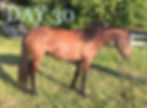Frustrations About Weight
- On Course Equine Nutrition
- Sep 22, 2021
- 4 min read
*I am currently sharing the frustration of weight tapes alongside several clients and want to let you all know that you are not alone! Estimating your horse's weight is vitally important for balancing diets and determining medication/worming protocol, but what do you do if you can't trust the precision of your weight measurement?

I had this brilliant idea to track the growth of my handsome, young Connemara-Thoroughbred cross gelding by noting his weight each month and putting it on a spreadsheet (because, yes, that is what nutrition nerds do). But when I started placing all of my measurements on a graph, I realized that I had used too many different weight tapes and the numbers made no sense at all. This bitter lesson is hard to swallow considering that I have been advising clients on the consistency of measuring techniques for more than a decade. I had been distracted by my curiosity about different methods of estimating weight including brands of weight tapes and the various body measurement equations. However, despite the frustrating imprecision of weight tapes, I still believe strongly in their consistent use for good diet management of horses young and old. The importance of weight control is especially true for horses at high risk for laminitis due to obesity and/or metabolic disease.
So, moving forward with this strong core belief, let's consider the many ways that horse owners can estimate their horse's body weight and the inherent strengths and weaknesses of each method. There are four ways the average horse owner can guesstimate their horse's weight.
4 Ways to Measure A Horse's Weight

1. A digital scale:
Digital scales are obviously the most accurate, but unavailable to most! Years ago, a local veterinary hospital built a new clinic with a permanent digital scale. I took advantage of this digital scale to "train my eye" on estimating horse weights. I loaded up my little herd (n=4) into the trailer and took a field trip to the veterinary clinic and put them all across the scale. I learned that I was generally underestimating weights by 100 lbs or more! Now, back home in Montana, I do not have access to one and am unsure if one exists in surrounding counties! The moral of this story is to TAKE ADVANTAGE of them if you have one in your area.
2. Weight tapes:
I have three weight tapes that I've collected over the years; Purina, Nutrena and Coburn brands. Yesterday, I put a piece of masking tape over the middle withers of my 3 year old, Coyote Coulee, and estimated his weight with each tape brand at the exact same location along the wither. I got three different readings ranging from 870 to 1,000 pounds! Without a digital scale to confirm which tape is the most accurate, I can not say for certain which is best. However, both the Purina weight tape and the weight equation were consistency between 950 to 1,000 pounds, so moving forward, I will trust that tape more. The BIG lesson here is consistency. Pick one weight tape and use it every time in the exact same place with the same amount of tension. The change over time is what really matters.

3. The Healthy Horse App by University of Minnesota Equine Extension: A brilliant idea, but easy to get wrong. When I first leaned what Dr. Krishona Martinson had done to produce this app, I was very excited. What a great idea! There are three things that I love about this app; 1) the research measurements used to design the equations are quite robust, 2) it gives you a target "ideal" weight as a sort of "goalpost", and 3) it splits horses up into breed/conformation types for presumably better accuracy. However, just like the weight tapes, it's NOT a perfect model and it can be troublesome to use due to imperfect measurements. I myself have found it frustrating at times. I took the four required measurements multiple times on my young horse and got weights between 953 and 1,004 pounds depending on how he was standing, where I started and stopped the body length measurement, and which "breed type" I chose. I recently had a client send me the results of her measurements that read Actual Weight 1,270 and Ideal Weight of 36 pounds! So, no, it's not the perfect answer, but it's still a great option in the absence of a digital scale. It does require some practice and patience to use proficiently.
4. The Equation: Girth Circumference x Girth Circumference x Body Length divided by 330 or 300 depending on which YouTube Video that you watch! On the same day that I used the weight tapes, I used a soft fabric tape to take these measurements in inches. I got a number roughly between the two weight tapes, about 960 lbs, so I thought it was actually a decent measurement method. Here it is again...
Heart Girth X Heart Girth X Body Length (point of shoulder to point of buttock)
330 (mature horse)
Recommendations
Despite the above weight estimation frustrations, I want to reiterate one more time the importance of this practice. Estimating your horses' weights on a regular basis will help take the guesswork out of what and how much to feed them. It will help ensure that you are feeding that supplement correctly and dispensing the correct amount of medication or dewormer. It's important to have a discussion with your veterinarian about wether that body weight is appropriate for your horses' activity level, environment, and the presence of any special needs. Do it once a month and log it in your phone calendar or notes app like I do. But unlike me, use the same weight tape every time! Good luck and may patience be with you!!!
Coyote Coulee Progress Below
When Coyote Coulee came to me in June of 2020 (yes he was my Covid project) he was a scrawny little two year old with a stunted, wormy look and poor hair coat. Within a few months, he was fattening up and shining like a new penny, but it took me several more months to realize how extensive his parasite load was and treat appropriately. Now, about a year and a few months later, I am stepping back to admire my nutritional handiwork. I just signed him up for his first horse show- the Future Event Horse at Spokane Sport Horse Farm (3 year old in-hand). Wish us luck! I'm so curious to see what the judges think of him as a future event horse!!!











